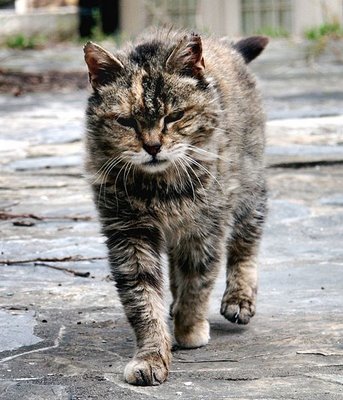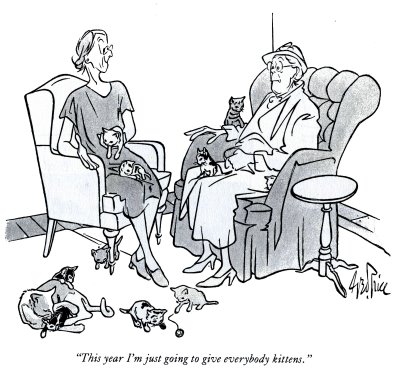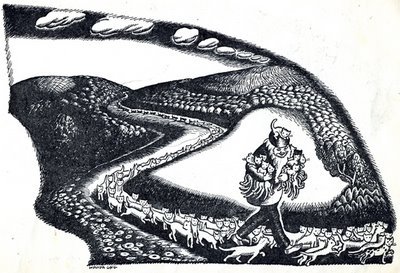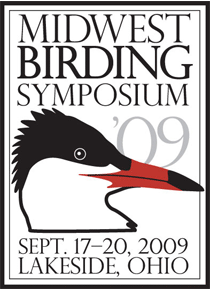Happy National Feral Cat Day!
 a feral photo from the Web; if I could find attribution I'd gladly give it.
a feral photo from the Web; if I could find attribution I'd gladly give it.Across the United States, perhaps 90 million domestic cats are kept, the majority of them allowed to roam and hunt outdoors. An additional estimated 70 million feral cats--nonnative predators that live by their wits outside-- annually kill hundreds of millions of songbirds and more than a billion small animals such as mice, voles, chipmunks and rabbits. The problem grows exponentially; one breeding pair of feral cats can produce produce 420,000 offspring over a seven-year period.

New Yorker Book of Cat Cartoons
Various solutions have been offered; among them are shooting (South Dakota and Minnesota permit shooting of feral cats) and the popular trap-neuter-release programs, in which volunteer veterinarians have spaying clinics for trapped feral cats. After that, the cats are released back into the habitats where they were trapped. Hmmm. And that's because these exotic predators belong in the wild, preying on native birds and animals? Ummm...Because nobody knows what else to do with a wild, unsocialized cat? Because it's a kind thing to do? Because it's OK with us that they're living on a diet of warblers, sparrows and thrushes, chipmunks and voles, frogs and lizards? Because it makes us feel better? What am I missing here? Is there something right and good about allowing cats to decimate native wildlife that I just don't get?
A California study showed that neutered feral cats live an average of seven years after being released; seven years in which they will continue to prey on native birds, reptiles and mammals.
A good summary of the issue can be found at National Geographic's web site.
In an effort to become more informed about the problem, I subscribed to Alley Cat Allies. I get their e-mailings, and I've learned some things I didn't know about feral cats and birds. Apparently, I'm mistaken in my conviction that feral cats kill a lot of birds. My 45 years of observations of cat predation on songbirds, including the countless cat-bitten songbirds I've dosed with antibiotics and tried to repair, are wrong: They eat mostly small mammals, insects, and reptiles, according to Alley Cat Allies. Oh, that's OK. Whew. Nobody much likes mice, bugs, and snakes anyway.
And did you know that, according to Alley Cat Allies, human activity in the form of unregulated hunting is actually the cause of the precipitous, non-cyclic decline of migratory birds, and the reason that migratory bird protection laws were passed? Well, that may have been true of shorebirds, gallinaceous birds and waterfowl in the market hunting days around the turn of the 20th century, but I haven't run into a human hunting party that's after tanagers, sparrows, thrushes, warblers, and vireos lately. I have seen an awful lot of those that were killed by cats, however. Hunting doesn't even enter into it: Habitat loss, window strikes, and cat predation are the Big Three songbird killers, and the studies exist to prove it.
Outside of the trap-neuter-release programs, which allow feral cats to go on doing their native wildlife predation work for an average of seven more years, the life span of a feral cat in the wild averages two years. It's a short, brutish existence, rife with disease and peril. Because they become pregnant as kittens when they're a few months old, before they've even attained full growth, two years is plenty of time for a female cat to crank out four or more litters. Which crank out more, and more, and more...70 million and growing. Millions and billions and trillions of cats.

From Millions of Cats by Wanda Gag
Living outside is rotten for cats, and feral cat predation devastates native wildlife. Cat predations is an unnatural, and most importantly, preventable cause of songbird and small mammal deaths. But people have to recognize the problem to do something about it. Education!
So, in celebration of National Feral Cat Day, this morning I sent a donation to the American Bird Conservancy's Cats Indoors campaign. You can donate online here, or send a check to:
American Bird Conservancy
Cats Indoors Campaign
PO Box 249
The Plains, VA 20198.
Please write: In Celebration of National Feral Cat Day in the "Memo" line of your check. Tell 'em I sent you.
Happy National Feral Cat Day! Party at my blog.
Labels: American Bird Conservancy, Cats Indoors, cats killing birds, feral cats, National Feral Cat Day






<< Home